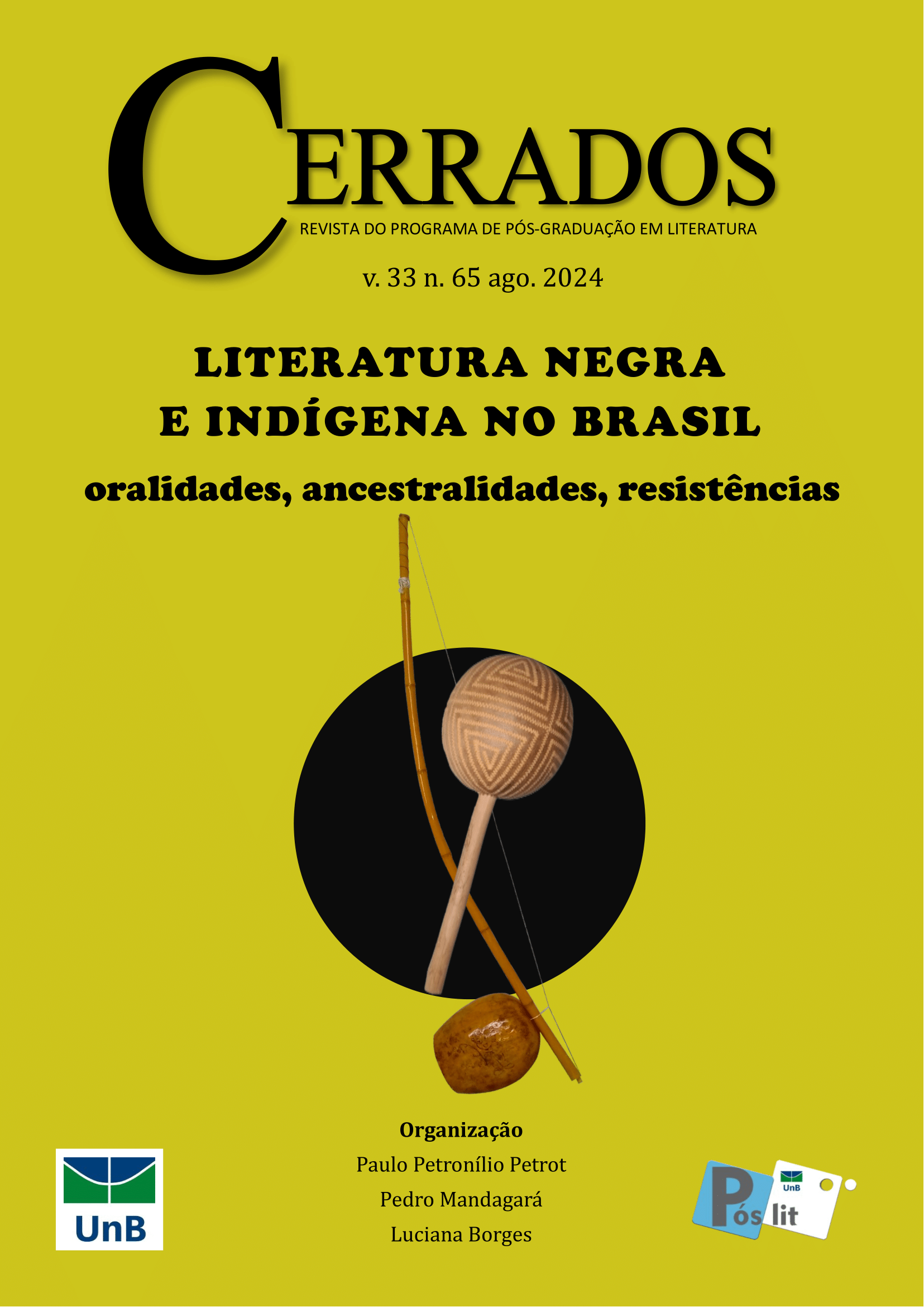“Whe talk about us”
slam at school, the voice that tells our story
DOI:
https://doi.org/10.26512/cerrados.v33i65.54118Keywords:
orality and corporeality, peripheral powers, education, spoken poetryAbstract
This article is created together with experiences of spoken poetry – Slam – at school. Poetry Slam is a cultural manifestation that revolves around oral and bodily poetic expression. A manifestation linked to the HIP-HOP movement, initially, is the effect of movements of young black people and those from the outskirts of large cities. Today, it is spread across different territories. Its themes are focused on the fight against racism, denouncing class, gender and sexuality inequalities. In this work, the research takes place alongside poetic experiences and workshops in public schools in the city of Juiz de Fora (MG). What emerges from the interventions of orality and poetic corporeality in schools? Affected by this question, this article brings verses created by the participants – students and elementary school students – in the exercise of telling their own narratives and reflections around orality, another corporeality and writing that becomes peripheral to what is given hegemonically.
References
AKOTIRENE. Carla. Interseccionalidade. São Paulo: Polém, 2019.
COELHO, Rogerio Meira. A palavração: atos político-performáticos no Coletivoz Sarau de Periferia e Poetry Slam Clube da Luta. 2017. 141 f. Dissertação (Mestrado em Artes) — Escola de Belas Artes, Universidade Federal de Minas Gerais, Belo Horizonte, 2017.
D’ALVA, Roberta. Estrela. Um microfone na mão e uma idia na cabeça: o poetry slam entra em cena. Synergies Brésil, São Paulo, n. 9, p. 119-126, 2011.
DAVIS, Angela. Mulheres, raça e classe. Trad. Heci Regina Candiani. São Paulo: Boitempo, 2016.
FERRARI, Anderson. Experiência homossexual no contexto escolar. Educar em revista, Curitiba, Edição especial, n. 1., p 101-116, 2014. Disponível em: https://www.scielo.br/j/er/a/pWr95VfbVfF5rPfDHSxfqHB/?lang=pt. Acesso em: 27 ago. 2024.
FREIRE, Paulo. Pedagogia da autonomia: saberes necessários à prática educativa. 25. ed. São Paulo: Paz e Terra; 1997.
FREIRE, Paulo; NOGUEIRA, Adriano. Que fazer: teoria e prática em educação popular. Rio de Janeiro: Vozes, 1989.
GOMES, Nilma Lino. O movimento Negro Educador: saberes construídos nas lutas por emancipação. Petrópolis, RJ: Vozes, 2017.
GONZALÉZ, Lélia. Por um feminismo afro-latino-americano. Rio de Janeiro: Zahar, 2020.
HERMÍNO, Beatriz. A escrevivência carrega a escrita da coletividade, afirma Conceição Evaristo. Institutos de estudos avançados da Universidade de São Paulo. Disponível em: http://www.iea.usp.br/noticias/a-escrevivencia-carrega-a-escrita-da-coletividade-afirma-conceicao-evaristo. Acesso em: 25 mai. de 2024.
MINCHILLO, Carlos Cortez . Slam: cartografia social e território poético. Disponível em: https://cdc.fflch.usp.br/sites/cdc.fflch.usp.br/files/inline-files/Slam%20-cartografia%20social%20e%20territo%CC%81rio%20poe%CC%81tico%20-%20Minchillo%20-%20marc%CC%A7o%202017.pdf Acesso em: 27 ago. 2024.
MONTEIRO, Daniella. Hip-hop completa 50 anos como ‘arma cultural’ para denunciar problemas sociais. [Entrevista concedida a] Jaqueline Deister. Centro de crítica da mídia. 15 de agosto de 2023. Disponível em: https://blogfca.pucminas.br/ccm/hip-hop-completa-50-anos-como-arma-cultural-para-denunciar-problemas-sociais/. Acesso em: 10 de dezembro de 2023.
PASSOS, Maria Clara. Pedagogias das Travestilidades. Rio de Janeiro: Civilização Brasileira, 2022.
SANTOS, Antônio Bispo dos. (Nego Bispo). A terra dá, a terra quer. São Paulo: Ubu Editora/ PISEAGRAMA, 2023.
SILVA, Elizabeth Marciano; GARRIDO, Elsa; STORI, Norberto; SANCHEZ, Petra. A escola e a cultura do jovem de periferia. In: SEMINÁRIO SOBRE PRÁTICAS DE LEITURA, GÊNERO E EXCLUSÃO, 3., 2005, São Paulo. Anais. São Paulo, 2005.
VAZ, Sérgio. A vida é loka. Portal Geledés, São Paulo, 10 de fevereiro de 2015. Disponível em: https://www.geledes.org.br/vida-e-loka-por-sergio-vaz/ Acesso em: 16 de maio de 2024.
Downloads
Published
Issue
Section
License
Copyright (c) 2024 Revista Cerrados

This work is licensed under a Creative Commons Attribution 4.0 International License.
Proibida a reprodução parcial ou integral desta obra, por qualquer meio eletrônico, mecânico, inclusive por processo xerográfico, sem permissão expressa do editor (Lei n. 9.610 de 19/2/1998 )



